Popoma
| Popoma | |
|---|---|
| Popoma | |
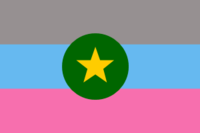 | |
| Pronunciation | [[po.po.ma] (Standard) [pɔ.pɔ.mɐ̝] (West) [po.po.mɐ̝] (South)] |
| Created by | Madoka |
| Date | Mar 2020 |
| Setting | Alt-Earth |
| Ethnicity | Magical Girls |
| Native speakers | 3,500,000 (2020) |
| Official status | |
Official language in | Magical Girls Republic |
| Regulated by | Headquarters of Magical Linguistics |
Popoma was created on the XIII Century by an italian magical girl during the Great Magic War between magical girls and witches. The first purpose of the language was to hide the attack plans of the magical girls from the witches. After the end of the war, the language was considered the official language of magical girls, overthrowing the reign of the Latin language, the acceptance of the new language grew quickly, in some years, all of the magical girls living in the Italian Peninsula knew Popoma. By the end of the XIII century, from the North of Africa, to the British Isles, from the Iberian Peninsula to Asia Minor, Popoma was a well spread language around the tongues of magical girls
History
External History
Popoma is my first "semi-serious" attempt in creating a conlang. I tried to take elements from the Romance Languages and the Japanese language for this one, for the writing system, imagination was the chief at the time, and with that I tried to make some parts of the script better. This language will always add anything new, specially in lexicon and phonology, if I'm not liking some sounds. I always thought about Magical Societies and Orders and if the people who were in it spoke another language. This is what I came up with, Popoma.
Internal History
Origins of Popoma (1225-1290)
During the Great Magic War (1220 - 1225), a magical girl whose name was Giovanna (1212-1229), she come up with a script and some new sounds to create a language that could confuse with witches and hide the true attack plans of the magical girls. The language was a sucess and the War was easily won some months after the language creation. The language was a sucess, and was quickly adopted as the Italian Magical Girl's official language. By 1290, the language was well spread around the European continent, including the North of Africa and Asia Minor.
Golden Age of Classical Popoma (1300 - 1667)
The language evolved as well the society of Magical Girls, in 1312, in Genoa, place of birth of Giovanna, was built the first headquarters of the Magical Girl's Order, where they taught Popoma and Magical Arts. During the Golden Age, the Order was powerfull and was an ally of the Humans. Which in 1437, the Pope Eugene IV and the then Headmistress of the Magical Girl's Order signed a treaty of friendship between the Magical Girls and the Catholic Church. The Magical Girls were also present at the Discoveries, staying in some settlements, where they looked for native magical girls in order to teach them Popoma. More headquarters were built in Europe.
| Year | City |
|---|---|
| 1312 | Genoa |
| 1365 | Rome |
| 1389 | Paris |
| 1415 | Coimbra |
| 1431 | Napoli |
| 1453 | Oxford |
| 1521 | Brest |
| 1530 | Lisbon |
| 1562 | Madrid |
| 1579 | Wien |
In fact, the presence of the Magica Girl's Order was more predominant in South Europe, ranging from Portugal to Sicily.
Decline (1667 - 1770)
During the 2nd Great Magic War (1662 - 1668), the witches were facing the magical girls again for the control of the HRE and Scandinavia. Of course, the Magical Girls society wasn’t that united, and at the beginning of 1667, a small group of them betrayed the Headmistress and taught the language to the witches of the North (most of them lived in places like atual Germany, Denmark and Poland). The chaos put into practice, due to the mistrust between Kings, Princes, Pope and magical girls, a lot of them were expelled from Europe, other suffered mass persecutions, since the monarchs didn’t know if someone speaking Popoma was a magical girl or a witch. Those years were known as the decline of classical Popoma. By 1668, few places still accepted the magical girls in Europe, this included Portugal, Corsica, Sardinia, Cyprus and England (Oxford area). But the Headmistress decided to call every living Magical Girl Order member to promolgue a migration act to Africa (1672 - 1773), and then later America (1696 - today) and Asia (1676 - today)
Popoma in Africa
The Magical Girl's Order, plus Popoma presence was already there before the migration, but unfortunally, the natives weren't very found of the language they used, since they already were using their own languages. Also, there was this new problem, the Europeans that said Magical Girls weren't welcomed in their territories, including oversea ones. So, Magical Girls needed to act illegally in Africa, unless they found some islands. Which they did, they claimed for theirselves the islands of Saint Helena, Ascension and Tristan da Cunha. The influence areas in continental Africa were abandoned by 1773.
Popoma in North America
America was a huge discovery, the girls started to migrate to Modern USA around 1696, and to Canada around 1705, sadly like in Africa, the Magical Girls were on illegal disguises to not show their magic to humans. But everything changed after the American Independence, the Magical Girls were happily accepted by the newborn state, even helping on the independence war. Most of Canadian Magical Girls fled to the United States, which is one of the biggest sectors of the Order.
| Year | City |
|---|---|
| 1831 | Boston |
| 1887 | New York |
| 1906 | San Francisco |
| 1911 | Dallas |
Popoma in Asia
| Year | City |
|---|---|
| 1812 | Shangai |
| 1815 | Seul |
| 1823 | Tokyo |
| 1824 | Kyoto |
| 1826 | Aomori |
| 1831 | Sapporo |
| 1858 | Sendai |
| 1864 | Saga |
| 1909 | Hong Kong |
Arabia and India
After Africa, the Magical Girls departed from Cyprus to go to India, but first they stopped at the Red Sea and the Socotra Islands where they faced with the Ottomans and the muslim Magical Girls, they clamed Socotra for the order and stay there for a few years until all Magical Girl Order members were expelled by the Ottomans, some stayed in Socotra, others sailed to India bringing Popoma with them. India presence was like african presence, the europeans were already there and their law was still in practice until 1908. The illegal settelments in India and Sri Lhanka were put in practice between 1715 untill 1779, but the influence there was huge. Popoma is the most spoken Magical Girl's Language in India.
China and Korea
Magical Girls reached China (Hainan) in 1782, Formosa in 1785 and Korea in 1788. They were easily accepted after knowing through translations that the Europeans were expelling their order from the continent. Here Popoma suffered alterations, the classical Popoma disappeared completly. They claimed the Jeju Island.
Japan
The Magical Girls reached Japan in 1792, with similar reactions like in China and Korea. Popoma changed too, and the three points of the Asian continent were connected by the Magical Girls and their language. Influence of Japanese in Popoma is really obvious, specially in new terms and words that appeared after 1800. The MGO claimed the Tsushima Island, the Iki Island and the Oki Islands.
Convention of 1800 and Modernity (1800 - today)
After the MGO was sucessfully established in Asia and in the claimed territories, a convention was held in Kyoto. This convention briefily resumed to three main points:
- Popoma is the official language of the Magical Girl's Order with a choosen vocabulary by the Ministry of Language
- The claimed territories of the Magical Girl's Order will become the Magical Girl's Order country which capital will be in Tsushima Island.
- Magical Girls must keep their powers in secret, unless it's necessary to use magic (this rule was deleted from manuals after 1909).
After centuries being neglected by the Europeans, a change of heart happened in some nations, this case United Kingdom, Italy and Russian Empire, and accepted magical girls again. New headquarters were built to replace the older ones that were abandoned and vandalized.
| Year | City |
|---|---|
| 1911 | Oxford |
| 1912 | Genoa |
| 1925 | Paris |
| 1928 | Coimbra |
Geographic distribution
Official Status
Popoma is the official language of Magical Girl's Republic (previously known as Matriarchy of the Magical Girls) which has a population of 892,313 people (2015). It is also an official language of the Community of Ex-Territories of the MGR (CETMGR) which has a population of 56,242 people (2015). It is also the main language used by the Conventions of the Magical Girl's Order, and in the headquarters/schools of the MGO worldwide.
Dialects
Standard Popoma is the most spoken language by the Magical Girls, but there's two variations on the Popoma language which are very noticeable.
| Standard | Western | South |
|---|---|---|
| Regular verbs end in vowel+h | Regular verbs end in h | Regular verbs end in vowel+h |
| d written as d | ð replaces d, written as th | d written as ť |
| ah, ih, oh, uh exist | there's no ah, ih, oh or uh | ah, ih, oh, uh exist |
| x | x | when a word ends with a vowel, the sound is either ɐ̝, ɔ, y orʉ |
| ʁ written as rr | ʁ written as ř | ʁ written as rr |
| tʃ written as c | tʃ written as c | tʃ written as ts |
| ɲ written as nh | ɲ written as nn | ɲ written as nh |
| kx written as ǩ | kx written as ǩ | kx written as kr |
Writing System
The writing system of the Popoma language was firstly the Popoma script, an alphabet created by Giovanna herself, which could make it more harder the decifration of the language by the witches. Later, in 1800, with the Convention it was approved that to complement the Popoma script, the Latin alphabet would be used. It was easier for young magical girls to learn Popoma.
| Order | Popoma Script | IPA | Latin Alphabet |
|---|---|---|---|
| 1 | 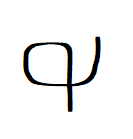 |
a | a |
| 2 | 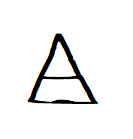 |
d | d |
| 3 | 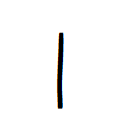 |
h | h |
| 4 | 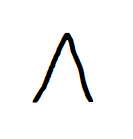 |
i | i |
| 5 | 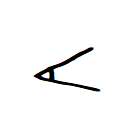 |
k | k |
| 6 | 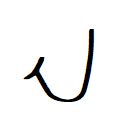 |
l | l |
| 7 | 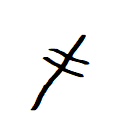 |
m | m |
| 8 | 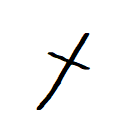 |
n | n |
| 9 | 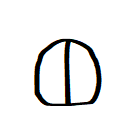 |
o | o |
| 10 | 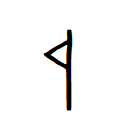 |
p | p |
| 11 | 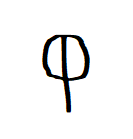 |
kʷ | q |
| 12 | 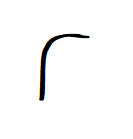 |
ɾ ʁ |
r rr |
| 13 | 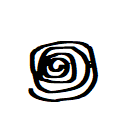 |
s | s |
| 14 | 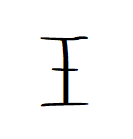 |
t | t |
| 15 | 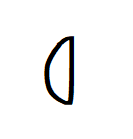 |
u | u |
| 16 | 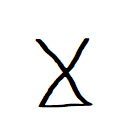 |
z | z |
| 17 | 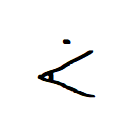 |
kx | k̇ |
| 18 | 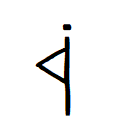 |
b | ṗ |
| 19 | 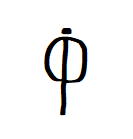 |
g | q̇ |
| 20 | 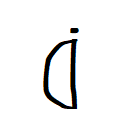 |
ɜ | u̇ |
| 21 | 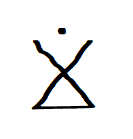 |
ʒ | ż |
Phonology
Consonants
| → PoA ↓ Manner |
Labial | Labiodental | Alveolar | Alveolopalatal | Palatal | Velar | Uvular | Glottal | |
|---|---|---|---|---|---|---|---|---|---|
| Nasals | m m | n n | nh ɲ | ||||||
| Plosives | Voiceless | p p | t t | k k q kʷ | |||||
| Voiced | ṗ b | d d | q̇ ɡ | ||||||
| Affricates | c tʃ | k̇ kx | |||||||
| Fricatives | Voiceless | ph f | s s | sh ʃ | h h | ||||
| Voiced | z z | ż ʒ | rr ʁ | ||||||
| Tap or flap | r ɾ | ||||||||
| Lateral Approximants | l l | lh ʎ | |||||||
Vowels
| Front | Central | Back | |
|---|---|---|---|
| High | i ih i y | uh ʉ | u u |
| Mid | u̇ ɜ | o oh o ɔ | |
| Low | a a | ah ɐ̝ |
Phonotactics
There's a lot of vowels and consonants clusters in Popoma, some becoming part of the language as part of the alphabet, others to be exclusive to certain dialects, others that happen because of the way people speak.
The "h" Combinations
In the vowels/consonants tables there were some sounds which are written on the latin alphabet as C/V + h, which changes the sound. This are the following:
- a a --> ah ɐ̝
- i i --> ih y
- o o --> oh ɔ
- u u --> uh ʉ
- l l --> lh ʎ
- n n --> nh ɲ
- p p --> ph f
- s s --> sh ʃ
In the West Dialect, there's no h combinations with vowels, plus there's an unique consonant h combination. t t --> th ð This sound replaced the dd sound on the standard and south forms.
Other Consonant Clusters
This clusters are mostly noticed on spoken part of Popoma, this means that they were formed during the speeching process. This clusters are:
| Written | Classic Popoma Pronuciation | Modern Popoma Pronuciation | |
|---|---|---|---|
| 1 | nq̇ | ng | ŋ |
| 2 | dz | dz | d͡z |
| 3 | dż | dʒ | d͡ʒ |
Morphology
Nouns
Nouns in Popoma inflect in number and degree. There's no gender inflection in Popoma, a non-gendered language. In the 1800 Convention was decided that the object of a magic spell, either human, animal or inanimate doesn't ask for a gender, which still is confirmed by Magical Linguists. This also works for adjectives and adverbs.
The variations in number are simple:
| Singular | Plural |
|---|---|
| mano "hand" | manos |
| kadzoh "liver" | kadzohas |
| ananahs "pineapple" | ananahsus |
| tu̇taraz "grouse" | tu̇tarazas |
Variation in Degree:
| Normal Singular | Diminutive Singular | Augmentative Singular |
|---|---|---|
| mano "hand" | manoni | manorron |
| kapora "goat" | kaporani | kaporarron |
| Normal Plural | Diminutive Plural | Augmentative Plural |
|---|---|---|
| manos "hands" | manonis | manorrons |
| kaporas "goats" | kaporanis | kaporarrons |
Nouns can be also be divided in 4 subdivisions, which are going to be explained later.
Nouns Classification by Number Inflection
A noun can be divided in countable or uncountable:
- Countable nouns have a plural form and usually include all common nouns, excluding abstract common nouns. We can set a numeric order with them.
- Uncountable nouns doesn't have plural form, this include the: abstract common nouns, collective nouns (this nouns already indicate a group of objects/animals/people), proper nouns and personal nouns. We can't set a numeric order with them.
Nouns Classification by Degree Inflection
A noun can be divided in inflectable and uninflectable
- Inflectable nouns have a diminutive and an augmentative form. This include all common nouns and all collective nouns.
- Uninflectable nouns doesn't have a diminutive and an augmentative form. This includes all proper nouns and all personal nouns.
Nouns Classification by Purpose
This is the main classification, usually the 4 used here are considerated as the 4 subdivisions.
- Common nouns are used to mainly name animals and things like utensils/instruments, food, abstract concepts, etc. They are inflectable but they can be either countable or uncountable.
- Collective nouns are used to name a group of animals, people, things, plants, etc, so they are uncountable, but inflectable.
- Proper nouns. Unlike in other languages, the proper names here are only used to name rivers, countries, cities, street names, geographic places, spell names, mountains, gods, saints, etc. They are uncountable and uninflectable.
- Personal nouns, some Magical Linguists consider as a subclass of proper names, the personal names name people’s names and familiars (Pets). They are uncountable and uninflectable.
Collective Nouns Formattion
| Common Noun | collective Noun |
|---|---|
| ronṗu "paper" | ronṗudżi "ream" |
| pishi "fish" | pishidżi "shoal" |
| lhuqo "wolf" | lhuqodżi "wolfpack" |
| ushi "cow" | ushidżi "cowherd" |
Verbs
In Popoma, verbs are divided into two classes: regular and irregular. All verbs that end with -h are regular, while the ones that doesn't have -h are irregular. There are only two irregular verbs, which are ka (to be) and ko (to do). The conjuction of the verbs is simple, there are only 8 tenses in Popoma.
The Verbal Tenses
Present tense is the one that leads the rest of the time in Popoma and it is the most simple to learn. The Present tense indicates an action that is happening right now or today.
Past tense indicates actions that happen in the Past, it is divided in three tenses: Proximal, Distant and Undefined, all of them feature the past particle (qa), a word that literally means "in the past", this word can be conjugated by person. Proximal Past indicates the action that happened in a recent past, while the Distant Past indicates the ancient past/much older past. Undefined Past indicates an action which we don't know the time of it.
Same thing works with the Future tense, Proximal, Distant and Undefined. The only thing that changes is the particle, the future particle (pho), means literally "in the future". Mostly, Magical Girls use the Undefined Past and Future in their sentences. Since in order to write a verb on the Distant or Proximal subtenses, an adverb of time is required.
Lasty, we have the Time Void tense or Undefined tense, that has a gnomic tense which means it doesn't limits action to certain period of time, Magical Girls use this tense when they're fighting while someone casts a time stop spell, or they are in the time void, a place where time doesn't exist.
Adjectives
The adjectives give qualities or defects to the subject (an animal, a person or an object). It deflects in number, degree and politness. There are three types of adjectives in Popoma:
Qualifying Adjectives
The only subclass of adjectives that varies on degree and politness, they can appear before or after the noun. This is also the only subclass that antonym-synonym relations. Some examples:
| Adjective | IPA |
|---|---|
| q̇orra "fat" | /go.ʁa/ |
| tolici "sweet" | /to.li.tʃi/ |
| kalhai "cute" | /ka.ʎai/ |
Numeral Adjectives
Gives the numeral part of a subject. It’s the numeral quantifier + -shia suffix
| Digit | Cardinal | Adjective |
|---|---|---|
| 1 | unho | unhoshia |
| 2 | duo | duoshia |
| 3 | tri | trishia |
| 4 | qatoro | qatoroshia |
| 5 | k̇inoh | k̇inoshia |
| 6 | siza | sizashia |
| 7 | sita | sitashia |
| 8 | ohita | ohitashia |
| 9 | nu̇pho | nu̇phoshia |
| 10 | daż | dażishia |
Relative Adjectives
Gives the origin, property, goal relations of a subject. There’s no a specific rule for change the subject into an adjective. They appear after the noun.
Pronouns & Determinants
Personal Pronouns
| Person | Romanization | IPA |
|---|---|---|
| 1st Sing | o | o |
| 2nd Sing | ohpo | ɔpo |
| 3rd Sing | ama | ama |
| 1st Plu | oma | oma |
| 2nd Plu | opoma | opoma |
| 3rd Plu | amamah | amamɐ̝ |
Articles
| Singular | Plural | ||
|---|---|---|---|
| Definite | a | as | |
| Indefinite | aho | ahos | |
Adverbs
Quantifiers
The quantifiers express a quantity of a certain subject. They are divided in four subclasses.
Numeral Quantifiers
Popoma numerals are mostly inherited from Italian and Portuguese. Bigger numbers are normally adapted from Japanese or with the previous Popoma numerals. This subclass of quantifiers also includes the fractional (+kakhu) and multiplicative (+zan) expressions.
| Digit | Cardinal | Pronunciation | Fractional | Multiplicative |
|---|---|---|---|---|
| 0 | zu̇oh | [zɜɔ] | (doesn't exist) | zu̇ozan |
| 1 | unho | [uɲo] | unhokakhu | unhozan |
| 2 | duo | [duo] | duokakhu | duozan |
| 3 | tri | [tɾi] | trikakhu | trizan |
| 4 | qatoro | [kʷatoɾo] | qatorokakhu | qatorozan |
| 5 | k̇inoh | [kxinɔ] | k̇inokakhu | k̇inozan |
| 6 | siza | [siza] | sizakakhu | sizazan |
| 7 | sita | [sita] | sitakakhu | sitazan |
| 8 | ohita | [ɔita] | ohitakakhu | ohitazan |
| 9 | nu̇pho | [nɜfo] | nu̇phokakhu | nu̇phozan |
| 10 | daż | [daʒ] | dahkakhu | dażan |
| 11 | dażunho | [daʒuɲo] | dażunhokakhu | dażunhozan |
| 20 | duo-daż | [duo daʒ] | duo-dahkakhu | duo-dażan |
| 100 | dażih | [daʒy] | dażikakhu | dażizan |
| 200 | duo-dażih | [duo daʒy] | duo-dażikakhu | duo-dażizan |
| 1000 | dażoi | [daʒoi] | dażoikakhu | dażoiozan |
| 10,000 | daż-dażoi | [daʒ daʒoi] | daż-dażoikakhu | daż-dażoizan |
Universal and Existencial Quantifiers
The Universal quantifiers quantify the whole. The Existencial quantifiers quantify some part of the whole
Universal quantifiers table
| Singular | Plural |
|---|---|
| tuti "all/every" | tutis "all/every" |
| ninhunu̇ "none" | ninhunu̇s "none" |
| (doesn't exist) | doshira "both" |
| doru̇ka "any" | (doesn't exist) |
| kada "each/every" | (doesn't exist) |
Existencial quantifiers table
| Singular | Plural |
|---|---|
| alkuni "some" | alkunis "some" |
| poka "few" | pokas "few" |
| molti "very/much/quite" | moltis "alot/very/many/quite" |
| sonhani "much" | sonhanis "many" |
| (doesn't exist) | paruci "various" |
| kanari "quite/plenty" | kanaris "quite/plenty" |
The Interrogative Quantifiers (How Much? / How Many?)
Taken from Portuguese, this quantifier introduces questions related to quantities. These types of questions are invariably answered using another quantifier.
Two interrogative quantifiers:
- Qati? / Qatis? - comes from Old Popoma, taken from Portuguese.
- Ikura? / Ikuras? - set as an alternative quantifier in the 1800 convention, taken from Japanese.
Prepositions
Prepositions are one of the easiest things that the language offer, location of something is normally given by the demonstrative (pronoun or determinant). Like the mentioned class of words, prepositions inflect in distance, number and formality.
Propositions also follow a different way of creation from other words. There are the "prepositional prefixes" those are the beginning of each preposition.
| Root Words | Meaning |
|---|---|
| zo | area/place |
| ha | altitude |
| luro | related to a place |
| oi | abstract prepositions |
| Prefixes | Meaning |
|---|---|
| ma- | close/near under low |
| na- | far high |
| a- | in to |
| i- | out without |
Conjunctions
Syntax & Other Grammar
Constituent order
Popoma is a SVO(C) language for the most part of the time, unless you are negating or interrogating. This means that the constituent order in Popoma isn't regular. The verb and the subject change positions when you want to negate or ask something. Making the SVO(C) into a VSO(C). At the end, there's a special case for this rule which will be explained further.
Magical Casting Sentences (MCS)
Like all European MGLs, Popoma has an unique way to cast their spells. It's always necessary the verb qopuh kʷopʉ (to cast, to throw). In Popoma's MCS, the subject is null, a trait taken from the Portuguese Syntax rules.
null subject qopuh (conjugated on present 1st person sing. or plu.) + object + adjective + adverb of time
Object: the thing the magical girl will cast her spell to. Adjective: element to give the trait or action that will happen to the object, it also can be a infinitive form of a verb. Adverb of Time: gives the time of duration of the spell, magical girls use hours and minutes.
Unlike normal sentences, MGSs don't change orders in negation. (There's no interrogative spells). Negation of spells are often used as counter-attack against the affirmative spells, like balanced.
Formation of the Negative and Interrogative Sentences
Vocabulary
Sample Text
UDHR Article 1
ARTIKOLO UNHO
"Tutis as umanis natoranhos liṗu̇s i u̇qoahas in diq̇itah i in diriti. Amamah ataruranhos di sainoh i di koshiniża, amamah dolhu̇rażinhos koih ahos para koh as outoras in shipirito di phatiri."
